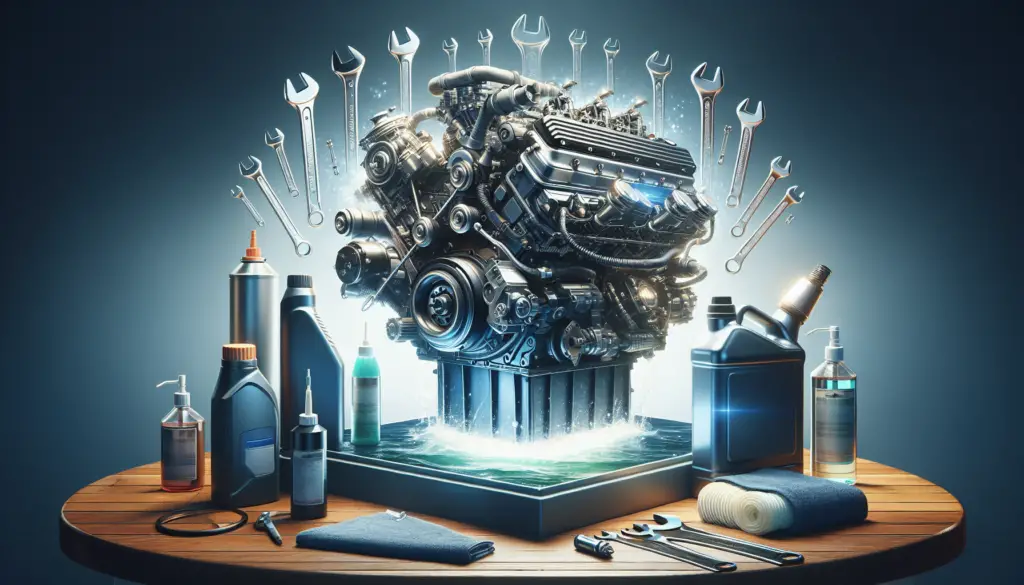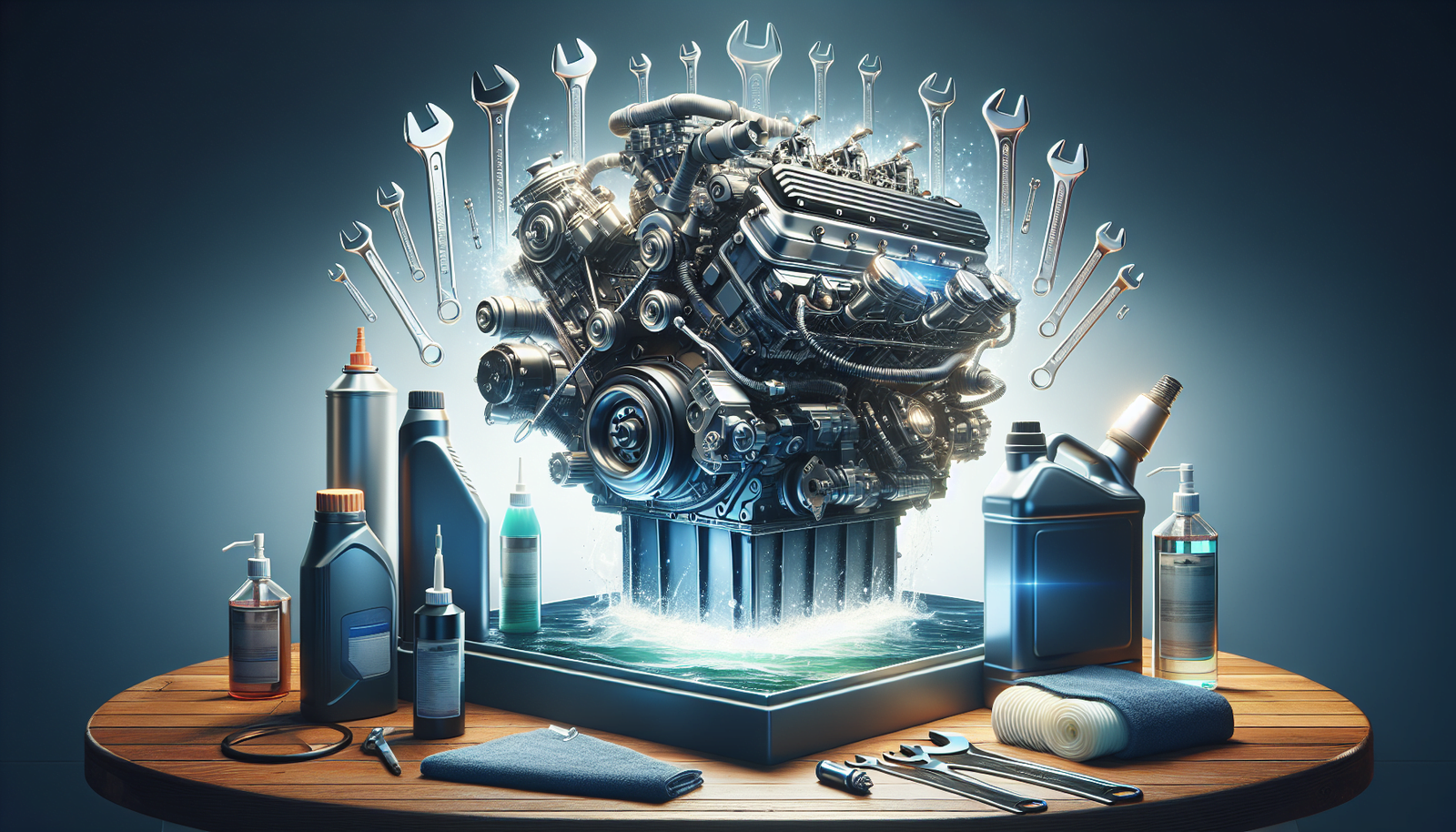Ever wondered why your boat’s performance seems lackluster? Perhaps, it’s about time you paid a bit more attention to the real heart of your boat – the engine. In the following article, “Best Ways To Keep Your Boat Engine In Peak Condition,” you’ll unearth an abundance of invaluable tips and tricks. We’ll help you keep your marine engine humming smoothly for years, eliminating unforeseen and inconvenient hiccups during your sea excursions. Get ready to turn your regular maintenance check-ups into a master class of engine care.
Understanding Your Boat Engine
As a boat owner, one of the most critical tasks is understanding your boat engine. This doesn’t just involve knowing how to start and stop it but delving deeper into the mechanics of it.
Knowledge of Basic Boat Engine Parts
You can’t possibly expect to maintain your boat engine properly without knowing the basic parts. Simple components like the spark plugs, air filters, fuel filters, and engine oil all play a significant role in engine performance and lifespan.
Acquainting Yourself with Engine Manufacturer’s Manual
The manufacturer’s manual is your best friend when it comes to understanding your boat engine. Here, you’ll get detailed information on the parts, functions, and even most common issues and how to troubleshoot them. Take the time to read through it, and you’ll be much better equipped to take care of your engine.
Understanding the Engine’s Basic Functions
The engine is the heart of your boat so getting a grasp on its basic functions is vital. You need to understand how the engine converts the fuel’s energy into motion to power your boat. This way, you’ll have a better idea of what might be wrong when things don’t seem to be working correctly.
Regular Engine Inspections
Regular engine inspections are an essential part of keeping your boat engine in peak condition.
Inspect for Engine Leaks
Periodically, you need to inspect your boat engine for leaks. Leaks can lead to loss of critical fluids like engine oil, which can bring your engine to a stop if not caught in time.
Examine the Belt and Hoses
Next, take a look at the belts and hoses. They should be firm and free of cracks or breaks. If you spot any signs of wear and tear or degradation, it’s time for a replacement.
Checking for Corrosion and Rust
Rust and corrosion are enemies of any metal equipment, and your boat engine is no different. Regularly check your engine and associated parts for these signs, especially if you sail in saltwater.
Monitoring Engine Temperature and Vibration Levels
Finally, monitor your engine’s temperature and vibration levels. If the engine runs hotter than usual or there are abrupt changes in vibration, it might indicate underlying issues that need immediate attention.

Regular Engine Maintenance
Maintaining your boat engine involves more than just inspections.
Importance of Regular Oil Changes
regularly changing the engine oil is key for the longevity and optimal function of the engine. Over time, engine oil loses its viscosity, reducing its ability to lubricate engine parts properly.
Changing and Checking Spark Plugs
Spark plugs play a vital role in firing up your engine, so naturally, you need to ensure they’re always in top order. This means regular checking and changing them when necessary.
Cleaning Air Filters
Air filters keep out dust and other particles from the engine. With time, these accumulate on the filters, impeding air flow. Regularly cleaning the air filters ensures that your engine gets the right oxygen mix it needs for combustion.
Fuel System Maintenance
The fuel system is a critical part of your boat engine. You need to periodically clean the fuel lines, change the filters, and ensure fuel quality is top-notch.
Seasonal Maintenance
Seasonal maintenance is also an integral part of keeping your boat engine in peak condition.
Preparing the Engine for On-Season Use
As the boating season approaches, there are steps you need to take to ready the engine for use. These include oil changes, fuel system checks, battery checks, amongst others.
Maintenance Steps for Off-Season Storage
Proper off-season storage protects your engine from damage due to inactivity. This involves steps like filling the fuel tank to prevent contamination and adding fuel stabilizer, amongst others.
Long-Term Storage and Its Impact on Engine Health
Long-term storage without the right maintenance measures can have drastic effects on your engine’s health. Avoid this by implementing the right off-season maintenance measures.

Proper Fuel Use and Management
The type and state of the fuel you use play a significant role in your engine performance.
Choosing the Right Fuel for Your Boat
Different engines require different fuels. Using the wrong fuel can lead to damaging the engine or reducing its efficiency. Always use the manufacturer-recommended fuel.
Minimizing Fuel Contamination
Fuel contamination is a common issue that can lead to engine issues. Proper storage and handling can help minimize this risk.
Using Fuel Stabilizers
Fuel stabilizers are critical, especially during long-term storage. They prevent the fuel from breaking down and damaging the engine.
Use of Quality Replacement Parts
The quality of the parts you use for replacements significantly affects your engine performance.
Benefits of Using Manufacturer Recommended Parts
Manufacturer recommended parts are designed to fit and function perfectly in your engine. This improves performance and lifespan.
Avoiding Use of Cheap Alternatives
Cheap alternatives might seem like a good deal, but they can lead to more harm than good. They may not function as expected and can accelerate wear and tear on other parts.
Knowing When to Replace versus Repair
Some parts can be repaired, but in some instances, replacement is the better choice. Knowing when to do which can save you a lot of troubles.
Monitoring the Cooling System
The cooling system controls the engine temperature and hence its performance.
Identifying Cooling System Issues
Some issues to watch out for include rising engine temperature, coolant leaks, and noises from the water pump.
Regular Cooling System Flushes
Flushing the cooling system gets rid of accumulated particles that can obstruct coolant flow, preventing overheating.
Replacing Worn Out Impellers
Impellers pump water into the engine for cooling. Worn out impellers can lead to overheating, and hence need to be replaced immediately.
Importance of Regular Use and Proper Mooring
Infrequent use and improper mooring can lead to engine issues.
Negatives of Infrequent Boat Use
Sitting idle isn’t good for your engine. Infrequent use can lead to issues like fuel contamination and battery drain.
Proper Mooring to Prevent Damage
Rough waves and storms can lead to engine damage. Proper mooring prevents such damage.
Bilge Pump Operation and Maintenance
The bilge pump plays a critical role in keeping your boat afloat
Understanding the Role of the Bilge Pump
The pump removes bilge water. Regular bilge pump operation and maintenance ensure a smooth sail.
Regular Cleaning and checkups of the Bilge Pump
Checkups ensure the pump is working correctly while cleaning gets rid of debris that can block it.
Professional Inspection and Servicing
Every once in a while, you should have your engine checked by professionals.
When to Seek Professional Maintenance Help
If issues persist despite your efforts, then it’s time to seek professional help.
Choosing a Reputable and Qualified Service Provider
Choosing the right service provider ensures your engine gets the best care possible, keeping it in peak condition. Make sure they’re reputable and qualified to handle your particular engine model.

